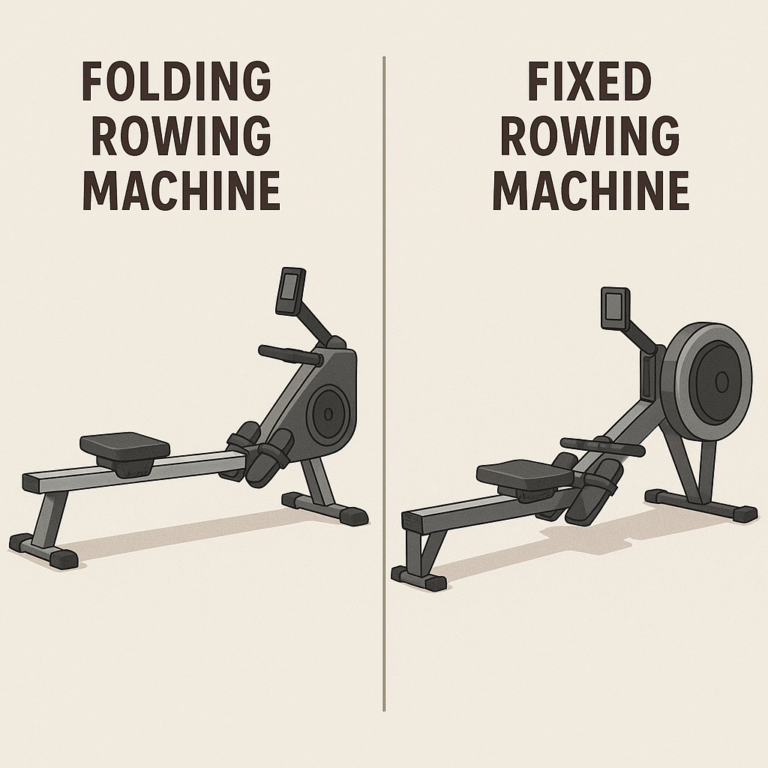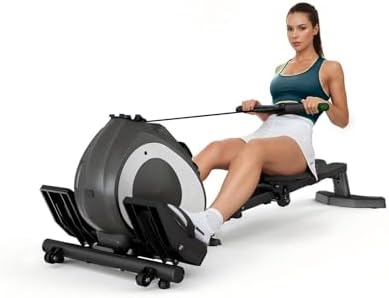Table of Contents
Introduction: Folding vs Fixed Rowing Machines
Rowing machines have become one of the most popular fitness equipment pieces for home gyms. They offer a full-body workout, boost cardiovascular health, and build strength without the harsh impact of running or weightlifting. But when it comes to choosing the right rowing machine, one major debate arises: Folding vs Fixed Rowing Machines.
Each option has its own set of advantages and drawbacks. Folding rowing machines are designed for convenience and storage, making them perfect for small spaces. On the other hand, fixed rowing machines focus more on stability, durability, and professional-grade performance.
So, which one should you buy? In this guide, we’ll dive deep into the pros and cons of folding vs. fixed rowing machines, covering everything from space efficiency and durability to maintenance and cost. By the end, you’ll know exactly which rowing machine fits your fitness lifestyle.
What Is a Folding Rowing Machine?
A folding rowing machine is specifically engineered for compact living. After your workout, you can fold the machine vertically or horizontally, depending on its design, to save space. This feature makes them highly appealing to people living in apartments, small homes, or anyone with limited gym space.
Key Features of Folding Rowing Machines
- Foldable design for easy storage
- Lightweight and often portable with built-in wheels
- Ideal for beginners and home users
- Often more affordable than fixed models
Why People Choose Folding Models
The main reason fitness enthusiasts choose folding rowing machines is space management. Imagine finishing your workout and sliding your rowing machine into a closet or corner. That’s the level of convenience foldable machines offer.
However, folding models often come with trade-offs—less stability, fewer advanced features, and sometimes lower durability compared to fixed rowing machines.
What Is a Fixed Rowing Machine?
A fixed rowing machine is a non-foldable, solid-built rower often used in professional gyms and training centers. These machines are designed for durability and performance. They take up permanent space, but in exchange, they deliver a smoother, more stable workout experience.
Key Features of Fixed Rowing Machines
-
Heavy-duty and durable construction
-
Designed for long-term, frequent use
-
Superior stability during intense rowing sessions
-
Often come with advanced resistance and tracking systems
Why People Choose Fixed Models
Fitness enthusiasts who take rowing seriously prefer fixed rowing machines because of their robust performance and reliability. If you plan to row daily, push your limits, or train at a competitive level, a fixed rowing machine is often the better choice.
The downside? They require a dedicated space, can be harder to move, and usually come at a higher price point.

Folding vs Fixed Rowing Machines: Pros and Cons
When comparing folding vs fixed rowing machines, it’s important to break down their advantages and disadvantages in detail.
Pros of Folding Rowing Machines
-
Space-Saving Design – Easily fold and store under a bed, in a closet, or against a wall.
-
Portability – Lightweight with transport wheels, making them easy to move around.
-
Budget-Friendly – Generally more affordable, making them great for beginners.
-
Great for Small Homes – Perfect for apartments, studios, or multipurpose rooms.
Cons of Folding Rowing Machines
-
Less Stability – Can wobble during high-intensity workouts.
-
Durability Issues – Not always designed for long-term, heavy use.
-
Fewer Features – May lack advanced tracking, resistance options, and connectivity.
-
More Maintenance – Hinges and foldable parts can wear out faster.
Pros of Fixed Rowing Machines
-
Maximum Stability – Provides a strong, sturdy base for intense workouts.
-
Durability – Built to withstand frequent, long-term use.
-
Advanced Features – Often includes performance monitors, preset programs, and resistance levels.
-
Professional Experience – Feels similar to gym-quality rowing machines.
Cons of Fixed Rowing Machines
-
Takes Up More Space – Requires a dedicated workout area.
-
Difficult to Move – Heavier and less portable.
-
Higher Cost – Premium quality usually comes with a premium price.
-
Not Ideal for Small Homes – Might be impractical if you don’t have enough space.
Which One Should You Choose?
The decision between folding vs fixed rowing machines depends on your lifestyle, fitness goals, and living space.
-
If you live in a small apartment or want something easy to store, a folding rowing machine is your best bet.
-
If you want durability, stability, and advanced features, and have the space for it, a fixed rowing machine is the smarter investment.
Conclusion
When it comes to Folding vs Fixed Rowing Machines, there’s no one-size-fits-all answer. Folding machines are ideal for small spaces, affordability, and convenience, while fixed machines excel in performance, durability, and professional use.
If you’re new to rowing or short on space, go with a folding machine. If you’re serious about training and want a long-lasting machine, invest in a fixed model.
That’s it for this post. If you enjoyed reading it, please make sure to read more of our blog posts related to rowing machines for expert guides, reviews, and fitness tips. And don’t forget to drop a comment below—we’d love to hear which type of rowing machine you prefer and why!





